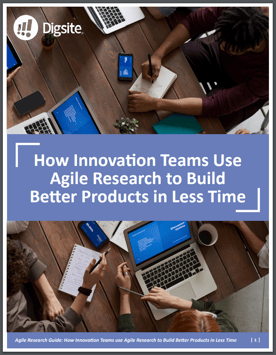In a 1989 letter to Berkshire Hathaway shareholders, Warren Buffett shared a lesson he learned over the course of his career that he’s stuck with ever since: After some mistakes, I learned to go into business only with people whom I like, trust, and admire.
Digsite CEO and Founder Monika Wingate frames it up in the video below: "it's not just about them (vendors and partners) being likable or someone that you enjoy working with but really about admiring their capabilities."
During a 1998 speech to MBA students from the University of Florida, Buffett reiterated that advice: If I could make $100 million with a guy who causes my stomach to churn, I would say no.
While this might seem like relatively straightforward advice, living by this rule might be harder than we think—especially as we are adopting more technology tools and using new vendors to move our research into today's more agile business world.
At the same time, each of these tenets - like, admire and trust - are more important than ever. After all, regardless of the technology, we’re all humans who are dealing with other humans who build, manage and maintain the software and data you put into it.
Like
First, let's talk about what it means to like your consumer insights technology partner? At it's core: You enjoy the quality of the service they’re offering. Whenever any issues arise, you also enjoy how the company responds to your problems. You might also like a business more if you have more than one contact there. That way, when issues arise, you’re not out of luck if your point person is out of the office.
In the realm of consumer insights, likability might also refer to the strong relationships you’ve built with consultants over the years—and how hard it might be to change those relationships because your needs have evolved.
If you like collaborating with the particular consultant, you may be focused on making existing relationships work. For example, Proctor & Gamble recently outlined how the company’s research needs have shifted in recent years—and how they still work with traditional research suppliers, just in a different way.
To illustrate the power of liking your consumer insights vendors, let’s consider the case of a Pella Window who shifted to Digsite to see how new technology could help them bring better products to market faster. In their case, liking was tied strongly to both the product and impact they had on internal decisions:
“We use Digsite for product innovation to find out what people care about the most and what we should prioritize. It's helpful to get research back quickly and to use it to move forward with confidence."
Trust
When we talk about trusting the vendors we do business with, what we mean is that we can expect them to be honest in what they can and cannot deliver. And that results in good experiences consistently over time. But researcher control over technology partners has changed in recent years.
Today, many larger organizations have have extensive purchasing and security reviews for new vendors, and consumer insights professionals have to invest significant time to bring in a new vendor.
How exactly can you build trust with research vendors when it's not about any one individual or project, but a broader technology platform and capability?
It takes time. But you can get a head start by doing your due diligence, implementing pilot programs to test them out, and actively seeking out references to find out what other customers are saying.
Admire
What does it mean to admire a research technology provider in the consumer insights world, and why is this critical?
For one, it means looking to partner with forward-thinking companies and people who understand how technology is changing and stay on the cutting edge of that evolution. It also means looking for partners that can help you make impactful decisions and deliver state-of-the-art solutions that will still fit as your needs evolve.
While you might have relied on the same research provider during the beginning of your career, those vendors might not be pushing the envelope. They may be perfectly good at doing what they’ve done for the last several years—and they might even be great at it.
But in the age of rapid technological innovation, like-ability and trust will only get you so far. You need the third piece of the puzzle—admiration—if you really want to be a game-changer.
Do You Like, Trust, and Admire Your Consumer Insights Provider?
Getting your organization to the next level starts with uncovering hidden insights and getting to understand why your customers feel the way they do.
To do that, you need to partner with the right agile research vendor that lets you test ideas rapidly and continuously iterate your products until you’re ready to bring them to market.
To learn more about how four real-world companies are moving away from costly and time-consuming stage-gate development processes and prioritize innovation while operating with agility, check out our new eBook: How Innovation Teams Use Agile Research to Build Better Products in Less Time.






